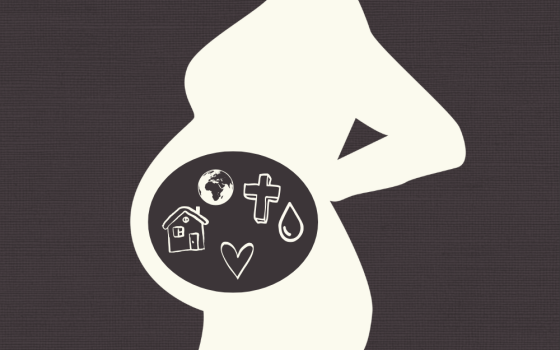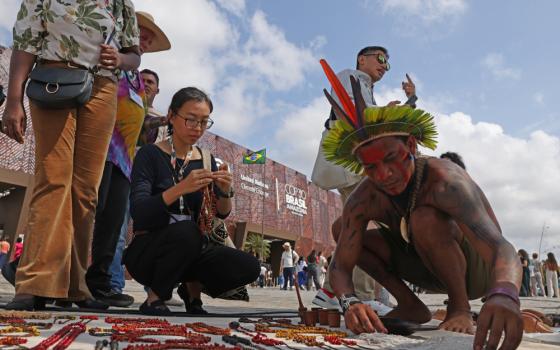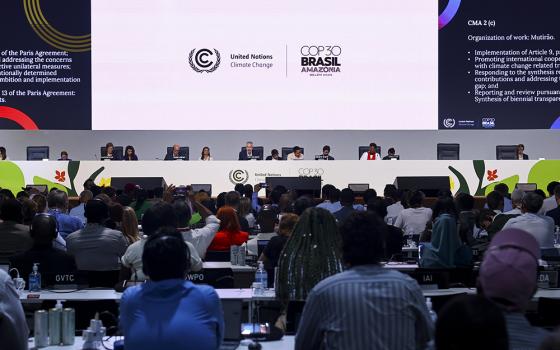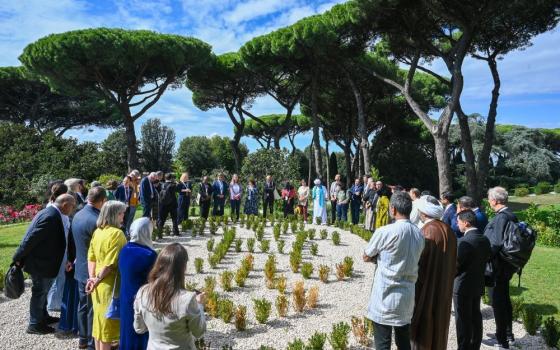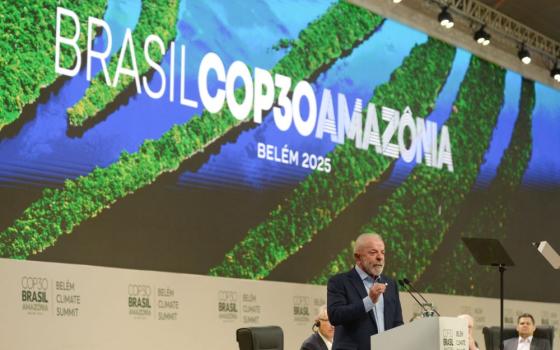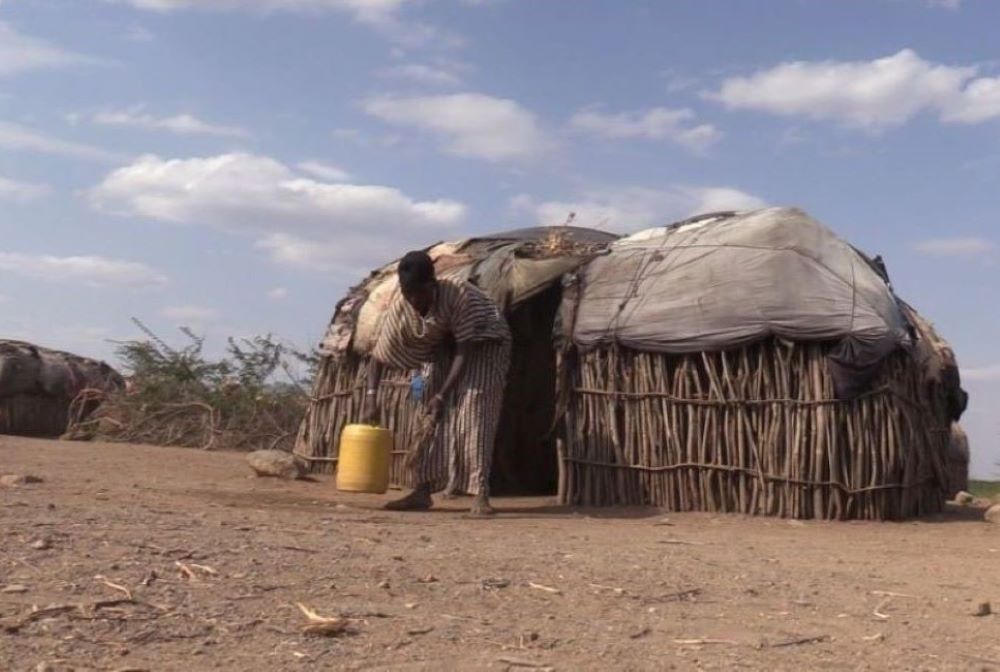
Jemima Cheruto bends to fetch water outside her home in Ortum, northern Kenya. Like many women in the region, she once relied on livestock but is now adapting to the effects of climate change. (Michael Kwena)
Editor's note: This story is part of Global Sisters Report's yearlong series, "Out of the Shadows: Confronting Violence Against Women," which will focus on the ways Catholic sisters are responding to this global phenomenon.
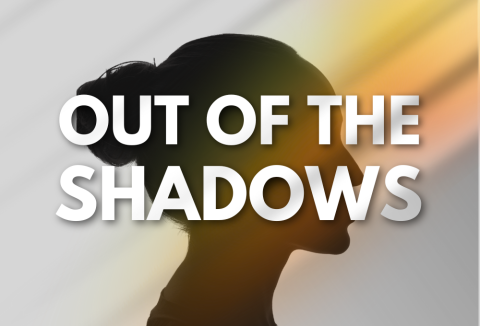
(GSR logo/Olivia Bardo)
In the blistering heat of this semi-arid town in northern Kenya, where cracked earth testifies to years of drought, Jemima Cheruto leans on her hoe and surveys her small plot of land. Once dependent on cattle, she now grows sorghum and onions, hardy crops that have become her lifeline as climate change tightens its grip on the region.
For years, livestock meant wealth and security. For women, it often meant stability in marriage. But when prolonged drought wiped out her herd, Cheruto's world collapsed.
"He used to beat me because I couldn't provide for the family," the 27-year-old mother of two said of her husband. "One day, he carried a machete. I ran with my children and never went back."
Cheruto's story is one of thousands unfolding across Africa as climate change fuels gender-based violence, displacement and hunger. But it is also a story of resilience. She joined a women's cooperative, learned to grow sorghum and vegetables, and built a small irrigation system to collect rainwater. Today, she sells her produce in the Ortum market, supporting her family on her own terms.
"I was broken," she said. "But I am not defeated. Farming gave me back my life."
'When the animals don't come home in the evening, the women are beaten. When floods sweep away houses, which women build, they are beaten again.'
—Sr. Consolata Moracha
As the world prepares for COP30 in Belém, Brazil, Nov. 10-21, stories like Cheruto's are central to Africa's push for a global climate deal that recognizes not only rising temperatures but the human cost. Women are on the frontlines of this crisis, and they want the world to listen.
Gendered toll of a warming world
Kenya faces overlapping climate disasters. In the north, drought has forced entire pastoralist communities into displacement camps. In the west, flooding along Lake Victoria has submerged homes and farmland. In both places, women bear the brunt of the burden.
Across the Horn of Africa, the crisis has pushed about 23 million people in Ethiopia, Kenya and Somalia into acute food insecurity. According to the United Nations Refugee Agency, as of late 2023, more than 2.3 million people had been internally displaced in Ethiopia and Somalia due to the drought. Children make up 40% of the world's internally displaced, and women face heightened risks of abuse during displacement, compounding the threat of gender-based violence.
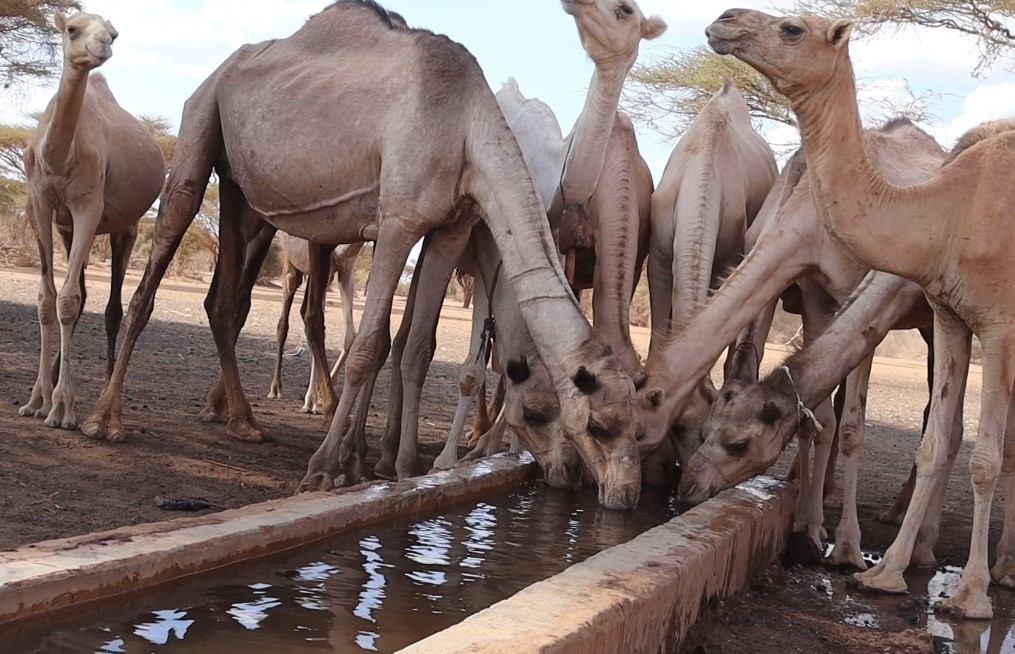
Camels drink from a trough in northern Kenya. Pastoralist communities have been among the hardest hit by recurrent drought, losing livestock that once sustained entire families. (Michael Kwena)
In Marsabit County, near the Ethiopian border, Fatuma Guyo once owned 85 goats and cattle. Now she tends a small plot of sorghum outside an informal camp.
"Life in the camp is dangerous," she said. "When you go to fetch water, men follow you. At night, we fear being attacked."
In Budalang'i, a flood-prone area along the shores of Lake Victoria in western Kenya, 16-year-old Lilian Atieno was displaced after floods destroyed her family's home. In the camp, she was exploited by an older man who offered her food, she said.
"I didn't want it, but I had no choice," she said quietly. "Now I have a child and I am not in school."
A gender study by the United Nations Convention to Combat Desertification and a 2022 drought review by the United Nations Office for the Coordination of Humanitarian Affairs found that women and girls in northern Kenya face significantly higher risks of gender-based violence, including attacks while traveling long distances to fetch water. Many walk up to 20 kilometers (12 miles) a day, exposing them to further danger.
"Women and children are paying the highest price," said Sr. Jancy Chiramel of the Missionary Sisters of St. Ann, Luzern. "They lose homes, then they lose their safety. Climate change is not just about the environment. It's about human dignity."
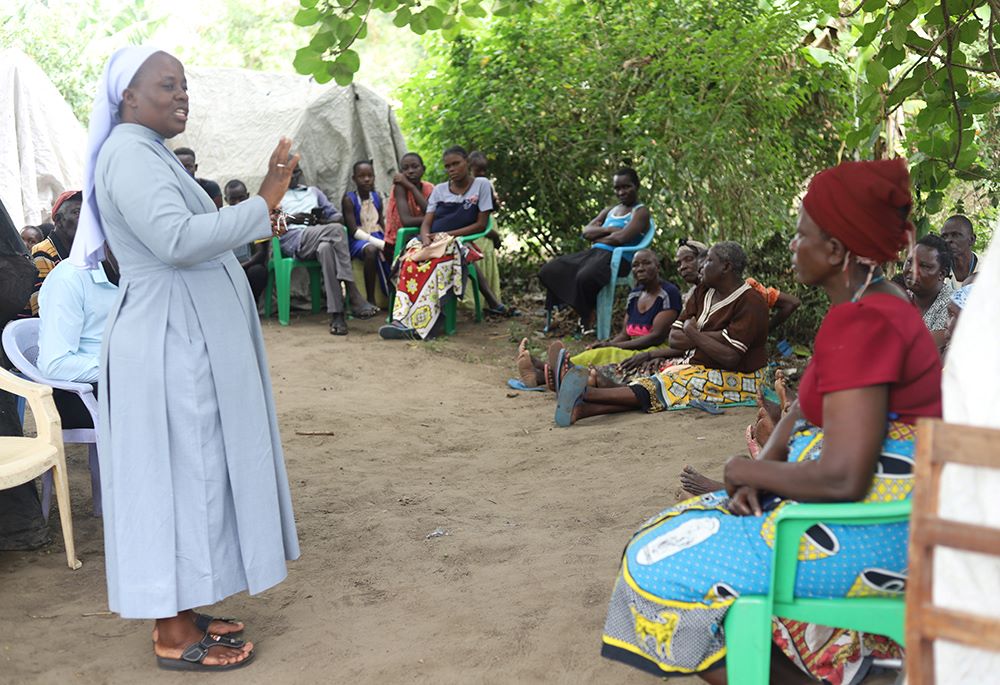
Sr. Celestine Nelima addresses flood victims at the Khumwanda displacement camp in Busia County. Faith-based groups are playing a critical role in supporting vulnerable women and families affected by climate change. (GSR photo/Doreen Ajiambo)
In pastoralist communities, livestock represents power and identity. When drought wipes it out, frustration turns to anger, and too often, that anger lands on women.
"When the animals don't come home in the evening, the women are beaten," said Sr. Consolata Moracha of the Sisters of the Incarnate Word and Blessed Sacrament in northern Kenya. "When floods sweep away houses, which women build, they are beaten again."
Without their own income, many women remain trapped in violent relationships. Others are forced into early marriages or risky survival strategies. Sharon Cheroloi, now 22, ran away from a forced marriage at 18 when her family lost their herd.
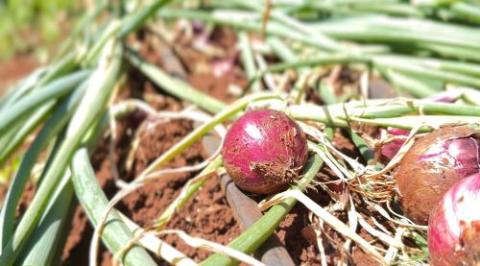
Red onions are ready for harvest in Ortum, northern Kenya. Drought-resistant crops, like onions and sorghum, have become a lifeline for small-scale farmers facing the harsh impacts of prolonged drought. (Michael Kwena)
"Our lives depend on men's decisions," she said. "When drought or floods come, they take it out on us."
Today, Cheroloi works as a teacher at a nursery school run by the sisters, a testament to what can happen when women have opportunities to rebuild.
Adaptation from the ground up
Yet amid this hardship, women are leading a quiet revolution of resilience.
In Ortum, Cheruto and other women are part of a climate-smart farming initiative supported by the Catholic Diocese of Kitale and Caritas Finland. The program trains women to grow drought-tolerant crops, harvest rainwater, and diversify their incomes through beekeeping, weaving and small-scale businesses.
In Budalang'i, women's groups are reinforcing riverbanks with bamboo, creating community drainage systems, and farming on higher ground. Faith-based shelters offer protection to women escaping abuse, while parishes open their doors to displaced families.
"We cannot stop the rain, but we can protect our daughters," said Fr. Dennis Oduory, who helps coordinate flood response in western Kenya.
Kenya's story is echoed across sub-Saharan Africa.
In Zambia, recurring droughts have slashed maize harvests. Women like Emily Banda in Choma District have turned to conservation farming, rotating crops, using mulch to retain soil moisture and installing solar pumps for irrigation.
"This is how we survive now," Banda said. "We farm differently. We had to."
In Malawi, when Cyclone Freddy hit in 2023, thousands of women lost everything. They rebuilt using stronger materials and formed disaster preparedness groups to respond faster to future storms.
'Climate justice is gender justice. If COP30 doesn't center women, then it will have failed half of the world's population.'
—Jackline Wanjiku
"When the cyclone came, we lost everything," recalled Esther Phiri, a mother of four. "But we learned to rebuild, this time smarter and stronger."
These examples underscore a shared truth. Women across Africa are already adapting to a crisis they did not create. But their efforts remain grossly underfunded.
A high-stakes COP30
The scale of the challenge is staggering. The Internal Displacement Monitoring Centre estimates that more than 26 million people were displaced by weather-related disasters in 2023, with the vast majority — about 70% — in Asia and Africa, according to the IDMC's Global Report on Internal Displacement. The World Bank warns that up to 86 million Africans could be displaced by 2050 if urgent action is not taken.
And yet, climate finance lags far behind the need. At COP28, wealthy nations pledged just $700 million to the Loss and Damage Fund, barely 0.2 percent of what experts say is required.
For climate activist and negotiator Jackline Wanjiku, COP30 represents a make-or-break moment.
"If leaders in Belém don't commit real resources, women like Cheruto will keep paying the price of a crisis they didn't cause," she said.
Wanjiku is part of a youth and women's climate coalition pushing African governments to demand stronger adaptation and loss and damage financing.
"The world talks about emissions and targets," she added. "But for us, climate change is not [a] theory. It's gender-based violence. It's hunger. It's children out of school. COP30 must deliver for frontline communities."
African negotiators and civil society groups are preparing a coordinated strategy to make women's adaptation a core agenda item at COP30. Their priorities include increasing loss and damage financing for countries hardest hit by droughts, floods and cyclones.
Climate activists at COP27 in Sharm El-Sheikh, Egypt, demand wealthy nations pay for loss and damage sustained during climate change-related incidents. At the summit, rich countries pledged about $700 million — less than 0.2% of what experts say is needed. (GSR photo/Doreen Ajiambo)
They also want adaptation funding to flow directly to women-led community groups, including farmers, faith-based organizations and local cooperatives that are already implementing grassroots solutions. Protection against gender-based violence would be integrated into all climate response frameworks, ensuring that safety and dignity are part of climate action.
Finally, advocates are calling for the recognition and elevation of women's leadership in climate resilience as a global best practice, not an afterthought.
"Climate justice is gender justice," Wanjiku said. "If COP30 doesn't center women, then it will have failed half of the world's population."
When policy meets survival
For Cheruto, COP30 feels far away. She won't be in Brazil. But the decisions made there, whether they unlock financing for adaptation, support for women farmers, or protection for those facing violence, could shape her future.
Her small farm is proof of what can happen when women are given tools to adapt. It is also a reminder of what is at stake if they are ignored.
"It's not easy," Cheruto said, bending to pull weeds from between her onion rows. "But at least now, I have something to give my children."
Advertisement
As negotiators, activists and world leaders gather in Belém, African women's voices will reverberate through the halls, even if many of them are thousands of miles away.
"Women like Cheruto are the backbone of climate resilience," Moracha said. "They are the reason many families are still standing. But their strength is not infinite. They need the world to stand with them."
Cheruto wipes sweat from her forehead and looks over her flourishing field of sorghum and onions, the crops that helped her rebuild her life from the ashes of drought and violence. Her voice is calm but unwavering.
"We are not asking for pity," she said. "We are asking the world to act. If they listen to us at COP30, maybe our children will have a future."




